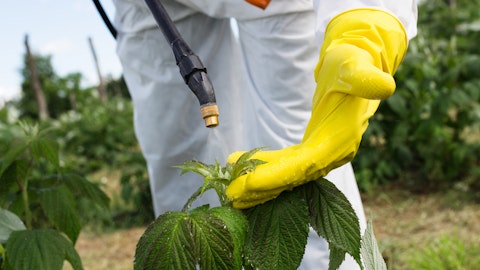Beena Goldenberg: Yes. I think the answer is, listen, we have still quite a bit of CapEx to spend this year. We’ve talked about it, as you mentioned, there’s $20 million more as we look at opportunities. We have the cash. So, we’re able to look at a longer time frame and look at return on investment capital expense that will help our ongoing margin improvements. So, this is around automation and efficiency driving. So while we have identified projects currently, we’ll continue to evaluate where we could continue to optimize our business and improve our margins, improve our profit in Canada. But certainly, we do have enough cash on our balance sheet to explore other opportunities. This is going to be an interesting year in 2023.
We all know that there — with the tight capital markets right now, a lot of companies are low on cash, and there might be great opportunities for us to explore. So, we have that optionality in our balance sheet that we will look for the right opportunities and hopefully continue to build what is a great business for us.
Ty Collin: Okay. Great. I appreciate the color. And maybe ripping off your comments on the opportunity set out there, could you maybe update us on how you’re thinking about U.S. opportunities might have changed following some of the recent disappointments in Congress and maybe whether this elevates some overseas investments in the pecking order or maybe even turn attention back to Canada in the near term in terms of potential M&A opportunities?
Beena Goldenberg: Right. So listen, I think we have mentioned many times on these calls that we wanted to establish a solid foundation in Canada. I think we’re there. If there’s the right Canadian opportunity that is, what I would say, complementary in terms of addressing some under-indexed segments in the marketplace, we might look at it. But really, we recognize that Canada is now in a good position, and it’s time to look outside the Canadian borders. We are watching Germany closely as most people are. While we saw draft regulations in the fourth quarter, we’re expecting to see their final regulation report out by the end of March. And so Germany is a market that we’re looking at, for sure. As for the U.S., it is disappointing with all the high hopes for safe to pass before the end of the year, and it didn’t.
But we — you can’t help but look at the U.S. market. It is right next door. And so we continue to look at the U.S. And while in the past, we looked at CBD opportunities as many of our competitors did because they were available to us with our current TSX and NASDAQ listing. What we’ve evaluated as most companies who invested in CBD have not seen the benefit of that investment, mostly because it is a highly fragmented market in the U.S. and until FDA regulates CBD, we don’t really see it as a great opportunity. So, that leaves THC opportunities, which we know we can’t do with our listings. But there are some creative ways that people are looking at that market, and we continue to explore opportunities that would be compliant to our listings and we’ll — if we find one, you’ll hear about it, obviously, but it’s something we’re looking at for sure because it is an important next evolution for our business.
Operator: Your next question comes from the line of Michael Freeman from Raymond James. Your line is open.
Michael Freeman: Congratulations on a terrific quarter. I wonder if you could comment on the result of the capacity expansions that you’ve completed and are in progress, respectively. How that is filtered into your ability to supply some of your most popular brands domestically. You’ve mentioned having limited supply relative to demand of the SHRED brand products. Wondering if you have been able to satisfy demand in some jurisdictions where you previously weren’t able to? And also how this capacity — these capacity expansions filter into your ability to supply international markets?





